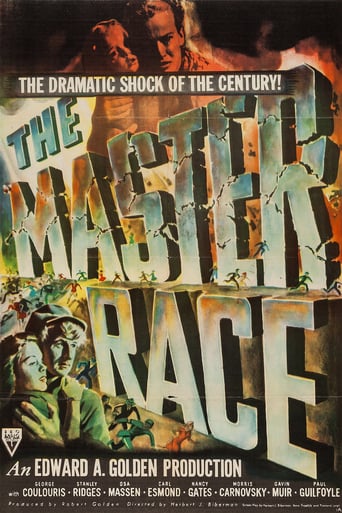

Disturbing yet enthralling
... View Moreif their story seems completely bonkers, almost like a feverish work of fiction, you ain't heard nothing yet.
... View MoreIf you're interested in the topic at hand, you should just watch it and judge yourself because the reviews have gone very biased by people that didn't even watch it and just hate (or love) the creator. I liked it, it was well written, narrated, and directed and it was about a topic that interests me.
... View MoreStrong acting helps the film overcome an uncertain premise and create characters that hold our attention absolutely.
... View MoreThe story is about a group of Nazis who try to blend in the with locals in the waning days of the war. One in particular, Colonel Von Beck (George Coulouris) is the star of the film...and his methods seem bent on sowing discontent and chaos. Can the Allies figure out who this man is before it's too late?According to IMDB, this film was rushed through production in order to capitalize on the recent Allied invasion of France. And, while I watched, the film did have a hurried feel to it. It wasn't due to the acting or music or cinematography but the story itself...a story that seemed like it needed a re-write as some of it was a bit rough. Some examples of how heavy-handed and shallow some of the scenes were would be the incredibly over-idealized Russian doctor as well as the church scene. In addition the film uses one of the worst cliches in film history...a person telling the evil person that they are going to turn them in to the authorities! You just KNOW what's gonna happen to this woman!By the way, despite me not enjoying the story, George Coulouris was wonderful as the Nazi agent...and he was always excellent in playing awful characters.
... View MoreHerbert Biberman (1900-1971) is the writer and director of this 1944 film. Biberman was a member of the left wing theatre group in New York City and was married to Gale Sondergaard. Both Biberman and Sondergaard were victims of the HUAC "red scare" – Biberman served time in prison and both were blacklisted.This was his third film as director, fifth as a writer.Lloyd Bridges (1913-1998) has a minor role in the film. Bridges too was briefly blacklisted but turned around and would be a staunch right wing presence.(Doc) Robert Golden produced the film. He also produced "Hitler's Children" (1943) which was directed by Edward Dmytryk, another director imprisoned during the HUAC trials. "Hitler's Children" was the most successful film for RKO, even surpassing King Kong, and led to this film being made.From the film there aren't many obvious communist themes, but there is a sympathetic Russian soldier and there is a lot of emphasis on people working together. The film is ardently anti-Nazi.George Coulouris (1903-1989) gives the best performance of his career. Osa Massen (1914-2006) is excellent.
... View MoreWhen Nazi George Coulouris realizes that the war seems to be a lost cause for the third Reich, he takes on the job of moving into a community now under American command where his duty is to create dissension to create the next wave of fascism. He finds mixed loyalties, resentments among the villagers and uses that to create more tensions and raise the growing resentments towards each other's individual political ideals. Crafty on the inside but with a facade of gentility, he really gets close to achieving his evil plans. Like Walter Slezak in the same year's "Lifeboat", Coulouris cleverly uses words to manipulate and passive aggressively twist the knife of doubt. The opening scene gives the impression that this is supposed to be in the future, following a recent trend of several films to show "what ifs" that predict the future, some with remarkable accuracy.The cast is filled with mostly unknowns or rather obscure character actors, the most well known being future star Lloyd Bridges. Osa Massen, who played mostly obnoxious femme fatales with nefarious plan, is quite gentler here, and more subtle than normal. This doesn't show the outwardly evil side of the Nazi party but the subtle plotting deep inside that stirred things up and made them a powerful enemy in the first place. It takes a while to find your way with each of the characters, but once you are in, you will find yourself hooked.
... View MoreThis film unfortunately is a corny and inferior one, which is a terrible shame, because the subject deserved an excellent treatment. The subject is the fate of Nazism at the end of World War II. From 1944, Nazism began a process of planned 'metastasis', a word which I take from oncology to compare its spread to that of cancer cells when the central tumor is abandoned as the main base of the disease and the cancerous cells spread throughout the body. This is shown in this prescient early film, at the beginning of the story, where officers of the Wehrmacht are given sealed instructions and false identities to spread themselves throughout the world and work in secret for the restitution of Nazi ideals in the future. George Coulouris plays the wicked Colonel von Beck who presides over this, and is the villain of the film. It was not the Wehrmacht officers who did this in reality, but the SS. And the process was set up and presided over by Heinrich Himmler and Martin Bormann. Some conspiracy theorists suggest that Bormann got away and that his 'skull' which was found was not really his. We do not need to concern ourselves with that issue here. When the Allies got to Berlin they found the Berlin Treasury empty. All the gold of conquered Europe had been stored there. It was never found. Its value today would be trillions of dollars. The ingots had apparently been hidden in poisonous chemical tanks of the chemical company I. G. Farben (the main foreign 'front' for the Gestapo throughout the 1930s and the War), since gold cannot be damaged by any chemicals, and only the unstable mixture of two separate acids known as aqua regia can dissolve it. The gold was shipped out to safe havens like Sweden, Chile, and Argentina, over a period of time. Nobody opens poisonous chemical tanks to inspect what might be at the bottom. Apparently, ten percent of the gold was meant to be permanently stored as a 'backup' and still is stored. The rest has over the decades been used by the metastasized Nazis to buy international corporations and banks and attempt to achieve economic dominance and power, with a collection of bribed 'tame politicians' to assist them along the way. Many of their collaborators do not even know that they are working for metastasized Nazis, because all the collaborators care about is the money. The new Nazi Internationalists threw the Hitler cult overboard, just as shown in this film. The film was written and directed by Herbert J. Biberman, an inferior writer and director in Hollywood who had been a member of the Communist-leaning theatrical group in New York known as 'the Group'. He was later blacklisted during the McCarthy Era. It appears that he was a member of the Communist Party. Certainly, the corny creation of a hero of the Soviets as a character in this film is the kind of nonsense one expects of political hacks when they get too carried away making movies, and cannot resist inserting some propaganda into a film which then makes the story partially absurd. I mention all of this because it appears that Biberman was given some accurate information about what the SS were up to in their programme of 'Planned Metastasis', and I believe it must have come to him from the Soviet agents by way of Party contacts. How else could he possibly have concocted this story so early on, as even today people are still figuring out what really happened? Therefore, Biberman was performing a genuine service by informing the public of the process at this early date. But he did so with such lack of skill and talent, and with such adolescent propagandistic fervour, that the film has made no lasting impact, and its message was lost. The unlikely spot of Kolar, Belgium, is chosen as the supposed location of all the action, if you can call it action. The film contains a fine performance by the Danish actress Osa Massen as a German woman who has been raped by German soldiers and borne a child who has no name because of the shame. Lloyd Bridges plays her husband who returns and struggles to come to terms with the situation, but his performance is mediocre, as there is not much in the script and even less in the direction to give him much to do other than to wrinkle his brow and look earnest from time to time. This film could and should have been an impressive one, but it is not. Someone should try this theme again, and make it work this time.
... View More